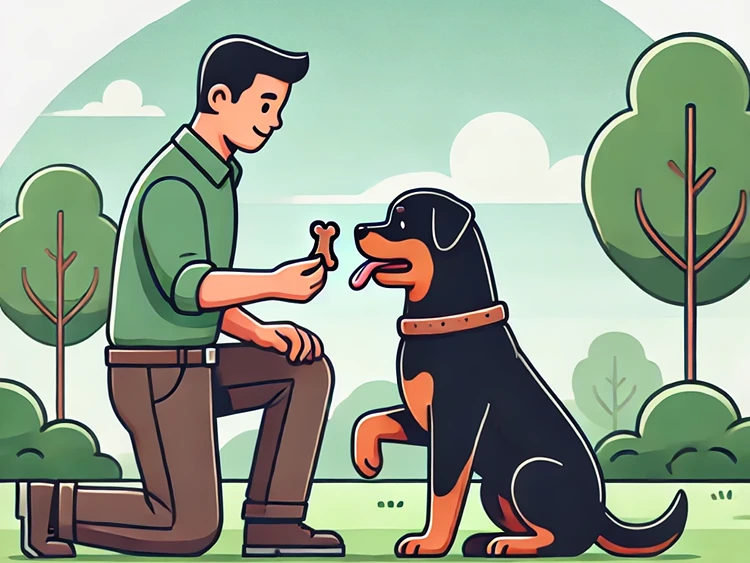The Rottweiler is a breed that commands respect and admiration. Known for their loyalty, strength, and protective instincts, these dogs can be wonderful companions when their temperament is understood and properly managed. Understanding the Rottweiler temperament is essential for anyone considering bringing one into their home. This article delves into the various aspects of Rottweiler behavior, offering insights into their temperament and tips for effective management.
What Defines Rottweiler Temperament?
Rottweilers are often characterized by their strong-willed, confident, and courageous nature. However, their temperament can vary depending on factors such as genetics, training, and socialization. Generally, a well-bred Rottweiler is calm, confident, and courageous without being aggressive. Understanding these traits can help in creating a harmonious relationship with your Rottweiler.
Confidence and Courage
A defining trait of the Rottweiler temperament is their innate confidence. These dogs are self-assured and can take on challenges without hesitation. Their courage is another hallmark; a well-trained Rottweiler will not shy away from protecting its family, making them excellent guard dogs. However, this confidence must be balanced with proper training to prevent overconfidence, which can lead to behavioral issues.
Paw-some Tip:
Build on your Rottweiler’s confidence with positive reinforcement. Reward good behavior consistently to reinforce their calm and courageous nature without encouraging aggression.
Loyalty and Protective Instincts
Rottweilers are known for their unwavering loyalty to their families. This loyalty often translates into a strong protective instinct, making them natural guardians. However, this protective nature can sometimes be misunderstood as aggression. It’s crucial to recognize that a Rottweiler’s protective behavior stems from their deep bond with their owners and their desire to keep them safe.
How to Manage Rottweiler Behavior Effectively?

Managing a Rottweiler’s behavior requires a combination of consistent training, early socialization, and understanding their unique temperament. With the right approach, Rottweilers can be well-mannered, loving companions.
Importance of Early Socialization
Early socialization is key to ensuring a well-adjusted Rottweiler. Exposing your puppy to different environments, people, and other animals helps them develop a balanced temperament. A well-socialized Rottweiler is less likely to exhibit fear-based aggression or anxiety, making them more adaptable and less reactive in new situations.
Consistent and Firm Training
Rottweilers thrive under consistent and firm training. These dogs are intelligent and eager to please, but they can also be stubborn. Establishing yourself as the pack leader is essential in managing their behavior. Positive reinforcement techniques, such as treats and praise, work well with this breed. Avoid harsh punishments, as they can lead to fear and aggression.
Rottie Stats:
According to a study by the American Kennel Club, 70% of well-trained Rottweilers show less aggression and better adaptability in family settings compared to those with minimal training.
Dealing with Rottweiler Aggression
While Rottweilers are not inherently aggressive, improper training, or lack of socialization can lead to aggressive behavior. It’s important to address any signs of aggression early. This can include growling, snapping, or dominant behavior towards other animals or people. Professional training may be necessary if you encounter challenges in managing your Rottweiler’s aggression.
Common Misconceptions About Rottweiler Temperament
Rottweilers often get a bad rap due to misconceptions about their temperament. Understanding the truth behind these myths can help potential owners make informed decisions about the breed.
Are Rottweilers Naturally Aggressive?
This is perhaps the most common misconception about Rottweilers. While they are protective and can be assertive, Rottweilers are not naturally aggressive. Aggression in Rottweilers is typically the result of poor breeding, lack of socialization, or improper training. A well-bred and well-trained Rottweiler is typically calm, loyal, and even-tempered.
Can Rottweilers Be Trusted with Children?
Another misconception is that Rottweilers are not suitable for families with children. In reality, Rottweilers can be excellent family pets when raised with children and properly socialized. Their protective nature can extend to children, making them great playmates and protectors. However, supervision is always recommended, especially with younger children, to ensure safe interactions.
Paw-some Tip:
Teach children how to interact respectfully with your Rottweiler. This includes understanding boundaries, not disturbing the dog during meals or rest, and recognizing signs of discomfort.
Understanding Rottweiler Energy Levels and Exercise Needs

Rottweilers are a high-energy breed that requires regular exercise to maintain their physical and mental health. Understanding their energy levels and ensuring they get enough exercise can prevent behavioral issues such as boredom and destructive behavior.
Daily Exercise Requirements
Rottweilers need at least 60 minutes of exercise each day to burn off excess energy. This can include walks, playtime in the yard, or structured activities like agility training. Regular exercise helps keep them physically fit and mentally stimulated, reducing the likelihood of destructive behaviors due to boredom.
Importance of Mental Stimulation
In addition to physical exercise, Rottweilers require mental stimulation. Puzzle toys, training exercises, and interactive games can help engage their minds. A mentally stimulated Rottweiler is less likely to develop behavioral issues and is more likely to be a well-behaved companion.
Rottie Stats:
Studies show that Rottweilers who receive both physical and mental exercise are 50% less likely to develop destructive behaviors compared to those who only receive physical exercise.
Key Milestones in Rottweiler Development
| Age Range | Developmental Stage | Behavioral Focus |
|---|---|---|
| 0-3 Months | Puppyhood | Introduction to socialization, basic commands, and environment exploration. |
| 3-6 Months | Juvenile | Continued socialization, introduction to more advanced training, and exposure to various stimuli. |
| 6-12 Months | Adolescence | Testing boundaries, reinforcing training, managing energy levels through structured exercise. |
| 12-24 Months | Young Adult | Solidifying training, maintaining socialization, managing protective instincts. |
| 2 Years and Older | Adult | Ongoing training, consistent exercise, ensuring mental stimulation and maintaining social skills. |
Socializing Your Rottweiler: Building a Well-Balanced Dog
Proper socialization is crucial in shaping a well-balanced Rottweiler. This process should start early and continue throughout their life. Socialization helps them adapt to new environments and situations, reducing the likelihood of fear-based aggression or anxiety.
Exposing Your Rottweiler to Different Environments
Take your Rottweiler to various places, such as parks, pet-friendly stores, and around your neighborhood. This exposure helps them get used to different sights, sounds, and smells, making them more adaptable and less reactive in unfamiliar settings.
Introducing Your Rottweiler to New People and Animals
Introducing your Rottweiler to new people and animals regularly can help them develop social skills and reduce the likelihood of aggression. Start with calm, controlled introductions and gradually increase the level of interaction as your dog becomes more comfortable.
Maintaining Socialization as Your Rottweiler Ages
Socialization should be an ongoing process throughout your Rottweiler’s life. Regular interactions with new people and environments can help maintain their social skills and prevent the development of fear or aggression as they age.
Paw-some Tip:
Consistency is key when socializing your Rottweiler. Make socialization a regular part of their routine to help them stay well-adjusted and confident in different situations.
Training Tips for a Well-Behaved Rottweiler
Training a Rottweiler requires patience, consistency, and a clear understanding of their temperament. These dogs are intelligent and eager to learn, making them responsive to training when approached correctly. Here are some essential training tips to help you manage and mold your Rottweiler’s behavior effectively.
Establishing Yourself as the Pack Leader
Rottweilers naturally look for a leader, and it’s important that you establish yourself in this role. Being the pack leader doesn’t mean being harsh; instead, it’s about setting boundaries and being consistent with rules. Positive reinforcement techniques work well, as Rottweilers respond better to rewards than to punishment.
Basic Commands Every Rottweiler Should Know
- Sit: A fundamental command that helps manage your Rottweiler in various situations.
- Stay: Essential for ensuring your dog remains in place, particularly in potentially dangerous situations.
- Come: A critical recall command that can keep your Rottweiler safe and under control.
- Leave it: Useful in preventing your dog from picking up something harmful or engaging in unwanted behavior.
These commands form the foundation of good behavior and should be reinforced consistently. Training sessions should be short and engaging to keep your Rottweiler interested and motivated.
Socializing Through Training
Training also provides an excellent opportunity for socialization. Group training classes can expose your Rottweiler to other dogs and people in a controlled environment. This not only helps them learn to interact appropriately but also reinforces the commands they are learning in a real-world context.
Addressing Behavioral Issues
Despite your best efforts, you may encounter behavioral issues with your Rottweiler. These can range from minor disobedience to more serious concerns like aggression or anxiety. It’s crucial to address these issues early and consistently. Consider consulting a professional trainer if you’re struggling to manage specific behaviors.
Managing the Protective Instincts of a Rottweiler
Rottweilers are naturally protective, and while this trait can be beneficial, it needs to be managed to prevent it from becoming problematic. Here’s how you can ensure that your Rottweiler’s protective instincts are directed appropriately.
Understanding the Protective Nature
A Rottweiler’s protective nature is rooted in their loyalty to their family. This trait, when properly managed, makes them excellent guard dogs. However, it’s important to differentiate between healthy protectiveness and aggressive behavior. A well-trained Rottweiler will protect their family without unnecessary aggression.
Training to Control Protectiveness
To manage your Rottweiler’s protective instincts, focus on training them to recognize and respond to commands like “sit” or “stay” when they feel the need to protect. This helps them understand that you are in control of the situation and can reduce overreactive behaviors.
Socializing to Reduce Overprotectiveness
Socializing your Rottweiler with other people and animals can help reduce overprotectiveness. The more they are exposed to different situations, the less likely they are to perceive every new encounter as a threat.
Paw-some Tip:
Teach your Rottweiler a command to “watch” and another to “relax” or “leave it.” This helps them understand when it’s appropriate to be alert and when they can stand down.
The Importance of Routine for Rottweilers
Rottweilers thrive on routine, and having a consistent schedule can help in managing their behavior. A well-structured routine provides them with a sense of security and helps prevent anxiety and destructive behaviors.
Creating a Daily Routine
Establishing a daily routine for feeding, exercise, and training can make a significant difference in your Rottweiler’s behavior. Consistent meal times, regular walks, and set training sessions help them know what to expect and reduce anxiety.
Adapting to Changes in Routine
While Rottweilers benefit from a consistent routine, it’s also important to gradually introduce them to changes. This can include varying their walk routes, introducing new activities, or adjusting feeding times slightly. Gradual changes help them adapt without becoming stressed or anxious.
Building a Strong Bond with Your Rottweiler
Building a strong bond with your Rottweiler is essential for effective training and managing their temperament. A well-bonded Rottweiler is more likely to be obedient, responsive, and happy. Here are some ways to strengthen your bond with your Rottweiler.
Spending Quality Time Together
Quality time spent together, whether through play, training, or simply relaxing, is vital for building a strong bond. Rottweilers are affectionate dogs that enjoy being close to their owners. Regular interaction helps reinforce your role as their leader and trusted companion.
Understanding Your Rottweiler’s Needs
Each Rottweiler is unique, and understanding their specific needs can help strengthen your bond. Pay attention to their body language, preferences, and responses to different activities. Tailoring your interactions to suit their needs fosters trust and deepens your relationship.
Rottweiler Temperament: Pros and Cons
Pros
- Highly loyal and protective, making them excellent guard dogs.
- Confident and courageous, able to handle various situations with ease.
- Intelligent and trainable, with a strong desire to please their owners.
- Affectionate with family members, forming strong bonds with their owners.
- Adaptable to various living environments with proper training and socialization.
Cons
- Can be overly protective if not properly socialized and trained.
- Requires consistent and firm training to manage their strong-willed nature.
- Prone to separation anxiety if left alone for extended periods.
- May be perceived as intimidating by strangers, leading to misunderstandings.
- High energy levels require regular exercise and mental stimulation.
FAQs
Wrapping Up
Rottweilers are known for their loyalty, confidence, and protective nature, making them excellent companions for those who understand their temperament. By focusing on early socialization, consistent training, and meeting their exercise needs, you can cultivate a well-behaved and balanced Rottweiler. Whether you’re a seasoned dog owner or new to the breed, understanding and managing Rottweiler behavior is key to building a strong bond with your furry friend. With the right approach, your Rottweiler will not only be a faithful guardian but also a loving member of your family.




